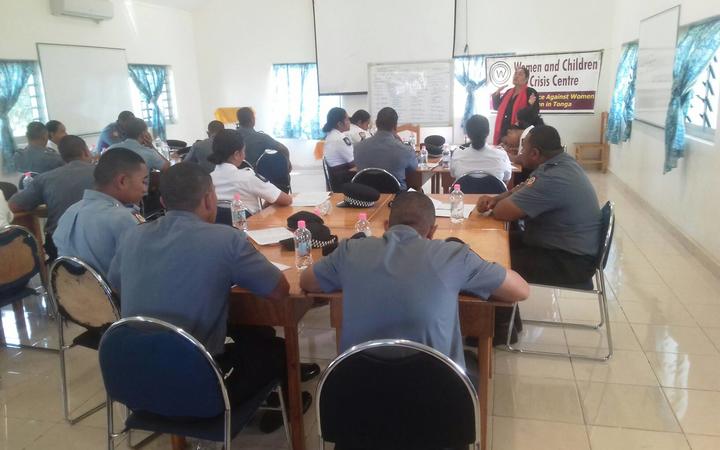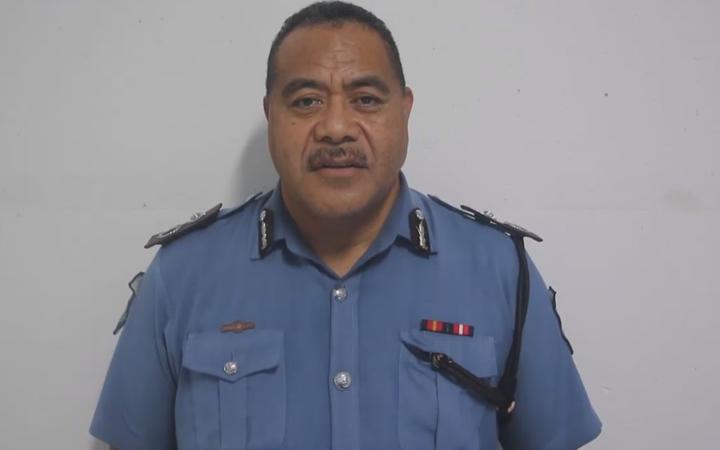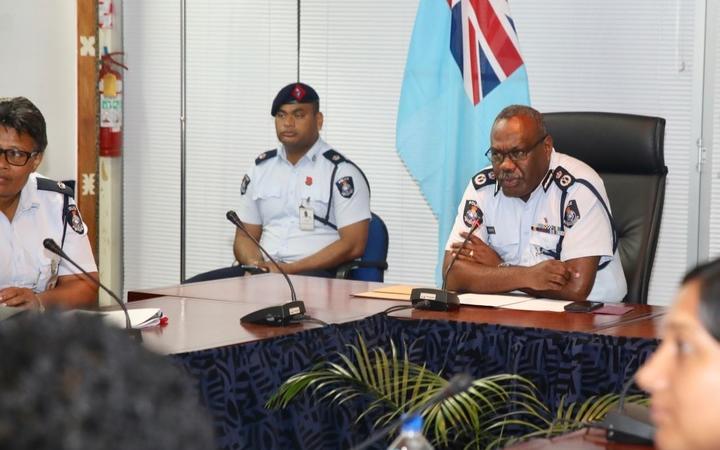Pacific policing under scrutiny amid Covid-19 pandemic
Efforts to prepare law enforcement agencies in the Pacific for the opening of borders amid the Covid-19 pandemic are underway in Fiji.
This comes alongside intense scrutiny of policing in the region following reports of officers failing to uphold the law they swore to serve and protect.

‘Ofa-ki-Levuka Guttenbeil Likiliki (addressing the group) conducts a training for new Police recruits in Tonga on gender, human rights and ending violence against women. October 2019 Photo: Women and Children Crisis Centre Tonga
In Tonga, 21 police officers were sacked last month over criminal convictions and serious disciplinary breaches.
Six officers in Samoa had been suspended after an investigation into allegations of adultery and inter-agency relationships in the force.
And 400 charges of serious violence had been laid against police in Fiji since 2015, figures from the Office of the Director of Public Prosecutions showed.
Tongan deputy police commissioner, Atunaisa Taumoepeau, said this was unacceptable behaviour and would not be tolerated.
“I believe law enforcement is important to everyone,” he said. “It’s just as indicative of what the law expects you to do.
“It’s how much police maintain the integrity of the oath they have taken.
“Some of the officers are working hard – some for up to 16 hours – and there are challenges,” he said.
“There are perpetrators showing them a lot of money and it’s hard to refuse. But knowing you’re a police officer, you should know your limits.”
Samoa’s Police Commissioner, Fuiavaili’ili Egon Keil, said the officers were there to protect and serve the public, not to engage in misconduct or breach the law.
Fuiavaili’ili said misconduct of any kind would not be tolerated.
His Fijian counterpart Rusiate Tudravu told officers at a recent workshop on gender-based that he likened the poor police service to beating an already distressed person until they cried.
“We are interrogating the victims like they are the suspects,” he said.
“Normal questions that police officers normally ask when the victims come in ‘where do you come from, are you married, are you single’. Identify who is the victim and who is the suspect.
“Relevant questions to whom and some of us are like when somebody is crying and then you’re trying to get a stick and hurt them more so they can cry a lot more.”

Acting Deputy Commissioner, ‘Atunaisa Taumoepeau Photo: Tonga Police
Training targets plan, development, funds
The first of a series of workshops to prepare police for the reopening of borders was organised by the United Nations Office on Drugs and Crime (UNODC) and the Pacific Islands Chiefs of Police (PICP) last week.
Outlining the objectives of the training, Kalusiani Vuki of the UN’s Pacific Maritime Crime unit, said travel restrictions had impacted the region’s tourism sector.
Vuki said the UN’s Global Maritime Crime Programme was working with the Pacific police chiefs’ secretariat and the Pacific Community for Law Enforcement Cooperation (PCLEC) to train officers preparing for the opening or joining of travel bubbles between Pacific countries.
Fiji’s Acting Commissioner of Police and PICP Chair Rusiate Tudravu said the workshops were a key takeaway from discussions held with the UN’s Pacific Representative, Sanaka Samarasinha, in September.
Tudravu said the talks centred on how to plan, develop and fund a curriculum for Training in Contact Tracing Methods and Related Operations for Pacific Police.
The director of the Pacific police chiefs secretariat, Glyn Rowland from New Zealand, said the PICP Strategic Plan had outlined how “security threats continued to evolve and grow in complexities and how policing had to evolve to counter these threats”.
Pacific policing unit opens in Fiji
Meanwhile, policing in the Pacific has received a boost with the opening of a regional law enforcement unit in Suva.
The decision to open a unit in Fiji was taken at the recent Pacific Islands Chiefs of Police (PICP) meeting.
The police heads had agreed the concept would consolidate regional, trilateral and bilateral police development.
At the launch last weekend, Tudravu said as PICP Chair, Fiji recognized the importance of driving initiatives under the Pacific Community for Law Enforcement Cooperation (PCLEC).
Tudravu thanked Australia for equipping the new unit which he said would help build a safer region.

Rusiate Tudravu. Photo: Facebook/Fiji Police
